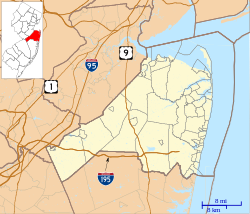Shadow Lawn (New Jersey)
Shadow Lawn | |
 The Great Hall at Shadow Lawn | |
| Location | Cedar and Norwood Avenues, West Long Branch, New Jersey |
|---|---|
| Coordinates | 40°16′46″N 74°0′19″W / 40.27944°N 74.00528°W |
| Area | less than one acre |
| Built | 1927 |
| Built by | Thompson–Starrett Co.[1] |
| Architect | Horace Trumbauer, Julian Abele[2] |
| Architectural style | Beaux Arts; French chateau; Italian Renaissance |
| NRHP reference No. | 78001780 |
| NJRHP No. | 2084[3] |
| Significant dates | |
| Added to NRHP | March 28, 1978[4] |
| Designated NHL | February 4, 1985[5] |
| Designated NJRHP | August 19, 1977 |
Shadow Lawn is a historic building on the campus of Monmouth University in West Long Branch, Monmouth County, New Jersey, United States. Built in 1927 for Hubert T. Parson, president of the F.W. Woolworth Company, it is one of the last large estate houses to be built before the Great Depression. It was designated a National Historic Landmark in 1985 for its architecture.[2]
Architecture[edit]
Shadow Lawn is a large masonry building, three stories in height, with a main facade that is over 300 feet (91 m) wide. A three-bay section projects at the center of the main (south) facade, with a Doric columned single-story portico at its front. A dentillated cornice separates the second and third floors, and a balustrade surrounds the roof, with sculptures mounted on some of the corner columns. The interior has more than 100 rooms, with lavishly appointed public spaces. An interior courtyard is 100 feet (30 m) long, with a covering skylight; its walls are adorned with plaster pilasters and arched window openings. The main hall features a well-concealed Aeolian Skinner organ, and the basement houses a bowling alley that saw little use during the Parson's ownership.[2]
History[edit]
The Shadow Lawn estate was first developed in the early 20th century by John A. McCall, president of the New York Life Insurance Company. Its main house was a 52-room mansion, which in 1916 served as the summer White House for President Woodrow Wilson.[6] Wilson planned many aspects of his reelection campaign from that house. In 1918, the estate was purchased by Hubert T. Parson, president of the F.W. Woolworth Company. The main house was destroyed by fire in 1927, and Parson and his wife Maysie immediately embarked on building an ostentatious replacement.[2]
Sparing no expense, they retained the noted Gilded Age architect Horace Trumbauer, and the design of the present building are credited to Trumbauer and his assistant, Julian Abele. The exterior garden landscape was designed by the French landscape architect Achille Duchêne. By the time the building was complete the Parsons had spent more than $10 million. They had continued work despite the onset of the Great Depression, which eventually ruined their finances. Unable to recoup his expenditures on the estate by selling it, the property was taken by the town for $100 in 1939.[7] After housing a girls' school for a time, it became part of Monmouth University in 1956.[7]
Shadow Lawn was listed on the National Register of Historic Places in 1978 for its significance in art, architecture, and landscape architecture and then declared a National Historic Landmark in 1985.[2][5]
The building was used to portray Oliver Warbucks' (Albert Finney) mansion in the film Annie.[7][8]
The current building was renamed from Shadow Lawn to Woodrow Wilson Hall after Monmouth's acquisition of the estate, honoring Wilson's occupation of its predecessor. In 2020, the building returned to its Shadow Lawn name, with the university citing Wilson's racist policies for the change.[9]
See also[edit]
References[edit]
- ^ "Early History of West Long Branch: Shadow Lawn". The West Long Branch Historical Society. Archived from the original on May 10, 2015.
- ^ a b c d e "National Register of Historic Places Inventory-Nomination" (pdf). National Park Service.
{{cite journal}}: Cite journal requires|journal=(help) and Accompanying photos (32 KB) - ^ "New Jersey and National Registers of Historic Places - Monmouth County" (PDF). New Jersey Department of Environmental Protection - Historic Preservation Office. January 10, 2010. p. 12. Archived from the original (PDF) on December 2, 2007. Retrieved April 7, 2010.
- ^ "National Register Information System". National Register of Historic Places. National Park Service. January 23, 2007.
- ^ a b "Shadow Lawn". National Historic Landmark summary listing. National Park Service. Archived from the original on February 25, 2007. Retrieved September 8, 2009.
- ^ Service, Bain News (1916). "Shadow Lawn, 9/2/16". www.loc.gov. Retrieved June 11, 2023.
- ^ a b c "History of Wilson Hall". Monmouth University.
- ^ Turan, Kenneth. "Annie", The New York Times, p. SM 40, May 2, 1982.
- ^ Budryk, Zach (June 21, 2020). "Monmouth University renaming Woodrow Wilson Hall". The Hill. Retrieved August 30, 2020.
External links[edit]
- Historic American Buildings Survey (HABS) No. NJ-1188, "Shadow Lawn", 1 measured drawing, 1 data page
- New Jersey Arts text and photographs
- Houses on the National Register of Historic Places in New Jersey
- Houses in Monmouth County, New Jersey
- National Historic Landmarks in New Jersey
- Houses completed in 1927
- Monmouth University
- F. W. Woolworth Company buildings and structures
- National Register of Historic Places in Monmouth County, New Jersey
- West Long Branch, New Jersey
- New Jersey Register of Historic Places
- Historic American Buildings Survey in New Jersey
- Beaux-Arts architecture in New Jersey
- 1927 establishments in New Jersey




